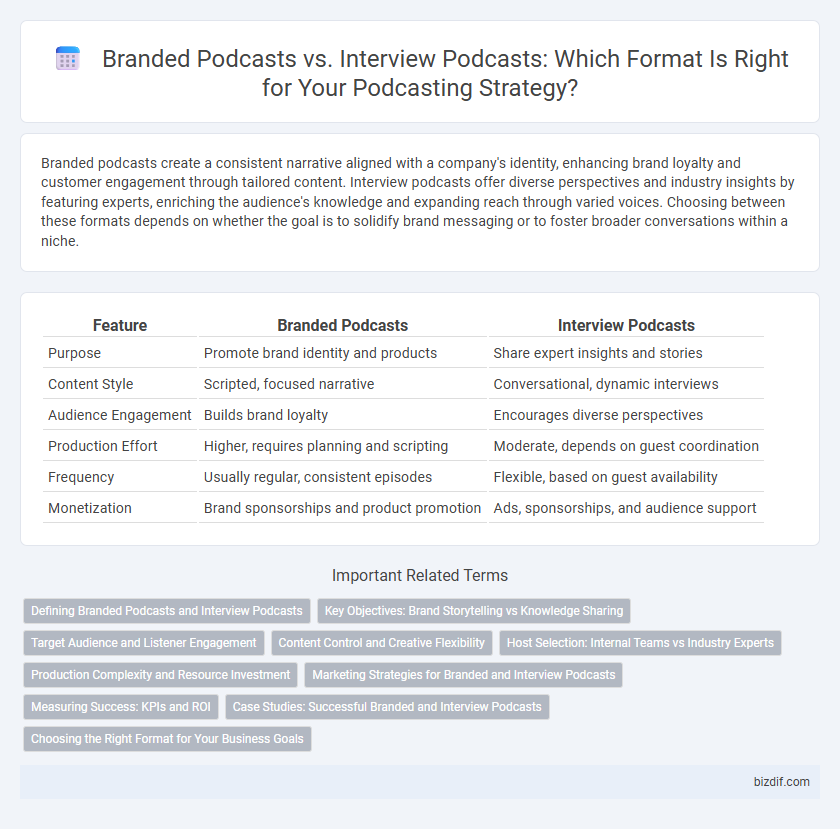Branded podcasts create a consistent narrative aligned with a company's identity, enhancing brand loyalty and customer engagement through tailored content. Interview podcasts offer diverse perspectives and industry insights by featuring experts, enriching the audience's knowledge and expanding reach through varied voices. Choosing between these formats depends on whether the goal is to solidify brand messaging or to foster broader conversations within a niche.
Table of Comparison
| Feature | Branded Podcasts | Interview Podcasts |
|---|---|---|
| Purpose | Promote brand identity and products | Share expert insights and stories |
| Content Style | Scripted, focused narrative | Conversational, dynamic interviews |
| Audience Engagement | Builds brand loyalty | Encourages diverse perspectives |
| Production Effort | Higher, requires planning and scripting | Moderate, depends on guest coordination |
| Frequency | Usually regular, consistent episodes | Flexible, based on guest availability |
| Monetization | Brand sponsorships and product promotion | Ads, sponsorships, and audience support |
Defining Branded Podcasts and Interview Podcasts
Branded podcasts are audio series created by companies or organizations to promote their brand identity, products, or services through storytelling, expert insights, and consistent messaging. Interview podcasts center around conversations with guests, often industry experts or influencers, to provide diverse perspectives and valuable information. Both formats offer unique opportunities for audience engagement, with branded podcasts focusing on controlled brand messaging and interview podcasts prioritizing authentic dialogue and knowledge sharing.
Key Objectives: Brand Storytelling vs Knowledge Sharing
Branded podcasts excel at embedding brand storytelling within engaging narratives that build emotional connections and reinforce brand identity, driving customer loyalty and awareness. Interview podcasts prioritize knowledge sharing by featuring industry experts and thought leaders, offering in-depth insights and practical advice that enhance audience expertise and trust. Both formats serve distinct key objectives; branded podcasts focus on cultivating brand affinity, while interview podcasts aim to educate and inform listeners.
Target Audience and Listener Engagement
Branded podcasts attract a highly targeted audience by aligning content closely with the brand's values and products, fostering deeper listener loyalty and consistent engagement. Interview podcasts broaden their reach by featuring diverse guests, increasing audience variety but possibly diluting brand-specific connection. Focusing on listener engagement, branded podcasts often generate higher retention rates, while interview formats encourage active interaction through varied perspectives and storytelling.
Content Control and Creative Flexibility
Branded podcasts offer companies comprehensive content control, enabling them to tailor messages closely aligned with their marketing goals and brand voice. Interview podcasts provide greater creative flexibility by allowing hosts to explore diverse topics and guest perspectives, fostering authentic conversations that can engage a broader audience. Both formats serve distinct strategic purposes in podcasting, balancing structured messaging with dynamic storytelling.
Host Selection: Internal Teams vs Industry Experts
Branded podcasts typically leverage internal teams as hosts to maintain consistent brand messaging and deep company knowledge, enhancing authenticity and control over content. Interview podcasts prioritize industry experts as hosts to establish credibility and attract a broader audience through diverse perspectives and expert insights. Choosing between internal hosts and external experts directly impacts audience engagement, content quality, and the podcast's overall strategic goals in brand positioning or thought leadership.
Production Complexity and Resource Investment
Branded podcasts require higher production complexity and greater resource investment due to scripted content, professional editing, and marketing strategies aimed at reinforcing brand identity. Interview podcasts often demand less intensive production, relying primarily on natural dialogue and simpler editing, but require strong guest coordination and scheduling. Both formats necessitate dedicated time and effort, yet branded podcasts typically incur higher costs and longer preparation cycles to ensure consistent messaging.
Marketing Strategies for Branded and Interview Podcasts
Branded podcasts leverage consistent messaging and storytelling aligned with company values to build brand loyalty and deepen customer engagement, utilizing targeted content that reinforces product narratives. Interview podcasts focus on thought leadership and expert insights, attracting niche audiences through authentic conversations that establish authority and foster trust in the industry. Effective marketing strategies for branded podcasts include cross-promotion on social media and integration with broader content marketing, while interview podcasts benefit from guest amplification and SEO-optimized episode titles to increase reach and audience growth.
Measuring Success: KPIs and ROI
Branded podcasts measure success by tracking metrics such as audience retention, brand lift, and conversion rates linked to marketing campaigns, emphasizing long-term customer engagement and brand awareness. Interview podcasts prioritize KPIs like listener growth, episode download numbers, and guest reach to evaluate audience expansion and influence within niche communities. ROI assessment in branded podcasts often involves direct correlation with sales and lead generation, while interview podcasts focus on sponsorship revenues and partnership opportunities for financial returns.
Case Studies: Successful Branded and Interview Podcasts
Successful branded podcasts like GE's "The Message" leverage storytelling to enhance brand identity and customer engagement, driving measurable increases in brand loyalty. Interview podcasts such as "The Tim Ferriss Show" utilize expert insights and diverse guest profiles to build a vast, loyal audience and generate substantial advertising revenue. Case studies reveal that branded podcasts excel in targeted marketing while interview podcasts thrive through broad audience appeal and valuable content variety.
Choosing the Right Format for Your Business Goals
Branded podcasts deliver targeted messaging that reinforces brand identity and drives customer loyalty, making them ideal for businesses seeking long-term engagement and consistent brand storytelling. Interview podcasts offer dynamic content through expert insights and diverse perspectives, perfect for businesses aiming to build authority and expand audience reach. Selecting the right format depends on whether your goal is deep brand integration or broad industry connections, aligning content strategy with measurable business outcomes.
Branded podcasts vs Interview podcasts Infographic

 bizdif.com
bizdif.com